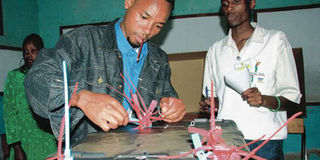Party agents are key to credible elections

Poll agents seal a ballot box at the end of voting exercise at Bidii Primary School in Buru Buru, Nairobi, in 2013. PHOTO | STEPHEN MUDIARI | NATION MEDIA GEOUP
What you need to know:
- In theory, party agents play a critical role in helping to ensure that only registered citizens vote, and that they vote only once.
- Agents are also allowed to oversee the counting and recording of votes in polling streams, and can check whether the same results are then tallied at local centres, and that these aggregates are then tallied at the national tallying centre.
As we approach next year’s election, there is already talk of whether or not the process will be undermined by malpractice. However, while there is a widespread fear, and, in some quarters, an assumption that the elections will be rigged, it is less clear what can be done to protect the popular vote to foster public confidence in the official results.
Much relies on the work and credibility of the electoral commission and other key institutions such as the police and Judiciary. However, there is another area in which opposition politicians and parties have much more control, but where their efforts nevertheless tend to fall short; namely, a network of loyal party agents.
In theory, party agents play a critical role in helping to ensure that only registered citizens vote, and that they vote only once. Agents are also allowed to oversee the counting and recording of votes in polling streams, and can check whether the same results are then tallied at local centres, and that these aggregates are then tallied at the national tallying centre. However, in practice, such oversight has proved incredibly difficult to organise.
First, candidates have to have an agent in every polling stream. These individuals then need to be trained and paid, and preferably provided with food and drinks. They need to stay alert for the entirety of the process and have the strength to object if any problems arise. They then need to hand over the necessary paperwork to the next set of agents, who need to remain alert and organised — and to enjoy sufficiently good access to information at local and national tallying centres — such that they can highlight ‘errors’ at any point in the chain.
I was recently in northern Uganda for the country’s elections where I was reminded of such issues. In Gulu, the voting and counting proceeded fairly smoothly. However, things changed at the tallying centre, where announcements were made regarding the winners of the parliamentary elections without the results for all polling stations being announced, and without details regarding the number and percentage of votes that each candidate had secured.
MADE LITTLE FUSS
This was against standard procedure, but agents and candidates made little fuss. This was true until the returning officer announced that Jacob Oulanyah of the ruling National Resistance Movement had been re-elected MP for Omoro. The problem: according to the opposition candidate, Simon Toolit of the Forum for Democratic Change (FDC), he had won the seat with 355 votes.
Further confusion followed. Among other things, 10 ballot boxes — including three filled with ticked ballot papers — were found at a barbers shop. The owner of the shop explained that he had been asked to look after the boxes by Electoral Commission staff — who he knew — because they had lacked transport.
But this begs a question, why did the agents not insist that transport be found? Perhaps because they did not understand what was meant to happen, or because they were tired and wanted to go home, or because they had been paid to turn a blind eye.
Toolit also lacks the declaration results forms (DRFs) for nine of the constituency’s 59 polling stations. This is because his agents — in clear contravention of the regulations — were denied a copy. Worse still, it seems that they were ‘deceived’ or paid to sign the DRFs in these 9 stations before the results had actually been filled in.
This is just one example of how party agents can fail to fulfill their oversight role and thus contribute to an election where it seems impossible to know who actually won. The lesson: agents cannot prevent every problem, but well-trained, loyal and vigilant agents can render elections much more transparent and credible.
As a result, and given the violence that disputed elections have triggered in the past, it seems an area worthy of attention and investment.
The writer is an Associate Professor of Comparative Politics, University of Warwick, UK ([email protected]; @GabrielleLynch6)





